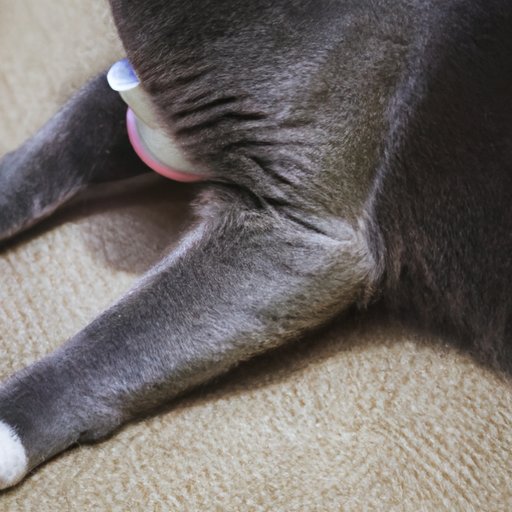I. Introduction
Male cats spraying can be a frustrating problem for cat owners. It’s the behavior where a cat marks its territory by spraying urine on objects or surfaces. This article will provide insights into why male cats spray, how to prevent and manage spraying behavior, medical reasons why cats spray, and the emotional impact of spraying on cat owners.
II. Understanding the Reason Behind Male Cat Spraying Behavior
For male cats, spraying is a natural behavior that allows them to mark their territory and establish dominance in their territory. A cat’s urine contains pheromones that release messages about its identity, sex, and reproductive status. By spraying, male cats inform other cats that they are in the area.
Other signs of territorialism in cats include scratching, vocalizing, and rubbing their faces against objects in their territory. If a male cat is feeling anxious or stressed, it may also start spraying as a way to feel more secure.
Other factors that may contribute to spraying behavior include changes in the household, moving to a new house, or the presence of new pets or other animals in the home.
III. Tips for Preventing Male Cat Spraying in the Home
To discourage your cat from spraying in your home, you may want to consider identifying common areas where cats spray and removing objects and furniture in these areas. You can also try using deterrent sprays, pheromone diffusers, or calming supplements.
If your cat has already sprayed in the home, it’s essential to clean the area thoroughly using an enzymatic cleaner that neutralizes the smell of urine. Persistent spraying can occur if a cat smells urine in an area it has previously sprayed.
IV. Medical Reasons Why Male Cats Spray
In rare cases, male cats may spray due to medical conditions such as urinary tract infections, bladder stones or blockages, or hormonal imbalances. These issues may cause a cat to experience pain or discomfort while urinating, which can lead to spraying behavior.
Some common symptoms of medical issues that may cause spraying include straining to urinate, blood in the urine, or frequent urination. If you notice these symptoms in your cat, it’s crucial to take them to a veterinarian for an examination and treatment.
V. The Role of Neutering in Preventing Male Cat Spraying
Neutering is the surgical removal of a cat’s testicles, which can reduce or eliminate spraying behavior in male cats. The procedure can reduce the amount of testosterone produced in male cats, which diminishes the motivation to spray in the home.
Studies show that neutering male cats before they reach sexual maturity can significantly reduce the likelihood of spraying. It’s important to note that neutering may not be effective in all cases, especially if spraying behavior is due to other reasons besides sexual motivation.
It’s essential to weigh the pros and cons of neutering before making the decision. While neutering may reduce the likelihood of spraying, it may also have negative effects on a cat’s health and behavior, such as weight gain and decreased activity.
VI. How Male Cat Spraying Impacts the Environment
Male cat spraying can cause damage to furniture, fabrics, and carpets in the home. Urine can leave behind unsightly stains and strong odors that are difficult to remove. The strong odor of cat urine can also increase the risk of respiratory issues in individuals with asthma, allergies, or other sensitivities.
To minimize the impact of spraying on your home, it’s essential to clean and deodorize urine areas promptly. Additionally, limiting your cat’s access to areas where they may be tempted to spray, such as windows or doors facing the outside, can help prevent spraying behavior.

VII. Understanding the Emotional Impact of Male Cat Spraying on Owners
Male cat spraying can feel overwhelming and stressful for cat owners, especially if the behavior persists over time. Constant cleaning and deodorizing of sprayed areas can increase a cat owner’s workload and add a financial burden with the need to replace damaged furniture and other objects.
Cat owners dealing with spraying behavior may feel frustrated, embarrassed, and anxious about their cat’s behavior. Coping mechanisms such as practicing stress-relieving techniques and seeking advice from professionals can help reduce the emotional impact of spraying behavior.
If a cat owner is struggling to manage their cat’s spraying behavior, it’s important to seek professional help from a veterinarian or animal behaviorist. These professionals can help identify the root cause of the behavior and provide effective treatment options.
VIII. Conclusion
Male cat spraying is a complex behavior that can have significant impacts on both cats and their owners. By understanding the root causes of spraying behavior and taking appropriate steps, cat owners can help reduce or eliminate spraying in their home. It’s essential to maintain a clean and healthy environment for cats to minimize the risk of medical issues that may cause spraying.
Cat owners should consider all available options before deciding whether to neuter their cat, and seek professional help when needed to cope with the emotional impact of spraying behavior. By working together, cat owners and their cats can live a happy, healthy, and stress-free life.
